Kunqu Opera was saved from the brink of being buried in history through elegant performances, Wang Kaihao reports.
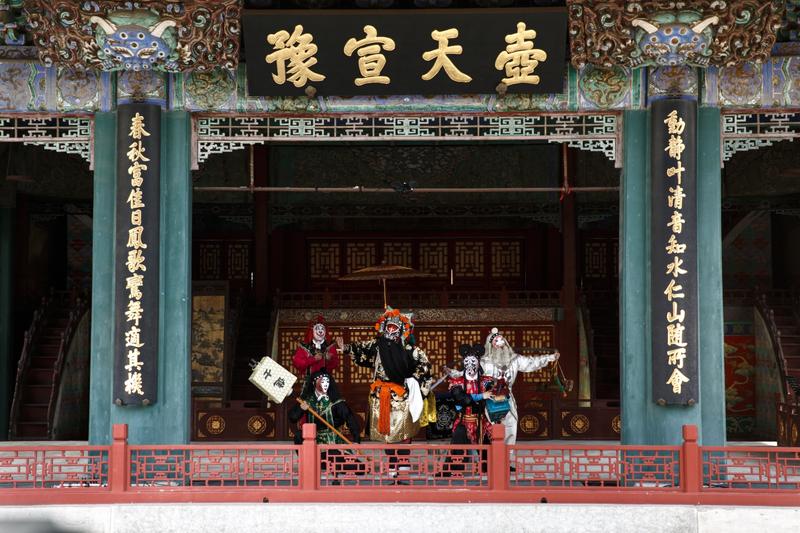 Performers present a well-known Kunqu Opera, Zhong Kui Marries off His Sister, at Changyinge in Beijing's Palace Museum. (JIANG DONG / CHINA DAILY)
Performers present a well-known Kunqu Opera, Zhong Kui Marries off His Sister, at Changyinge in Beijing's Palace Museum. (JIANG DONG / CHINA DAILY)
When Kunqu Opera was listed as one of the Masterpieces of Oral and Intangible Heritage of Humanity by UNESCO in May 2001-the first entry from China on that list, many Chinese people probably wondered why it had such a privilege.
Though the stage art is generally considered one of the oldest Chinese opera genres dating back to the Ming Dynasty (1368-1644), it greatly contributed to the formation of the much better-known Peking Opera.
Originating from Suzhou in Jiangsu province, Kunqu Opera is famed for its elegance in performance style, lyrics and costumes.
Tian Qing, a veteran musicology researcher at the Chinese National Academy of Arts, says Kunqu Opera only became gradually popular with the public after being listed as an intangible heritage of humanity, which greatly promoted its cultural values.
"More than 20 years ago, it was mainly the government and the cultural circle's interest and duty to protect it and prolong its life," Tian says.
"Fortunately, it was reborn in 2001."
To celebrate the 20th anniversary of its rebirth, a special Kunqu concert was recently held at Changyinge, or the Pavilion of Cheerful Melodies, in the Forbidden City in Beijing.
Now known as the Palace Museum, the Forbidden City was China's imperial palace from 1420 to 1911.Built in 1772 during the reign of Emperor Qianlong in the Qing Dynasty (1644-1911), the three-story pavilion used to be a venue where the ruler and his successors enjoyed the finest operas from across the nation.
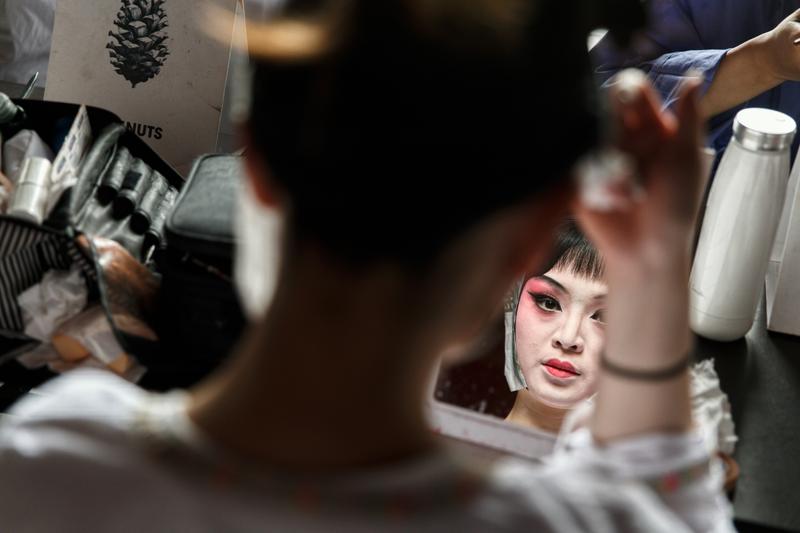 Performers from the Northern Kunqu Opera Theater in Beijing prepare backstage for a special concert at Changyinge, or the Pavilion of Cheerful Melodies, in the Forbidden City in Beijing. The concert, in May, celebrated the 20th anniversary of the opera style being listed as one of the Masterpieces of Oral and Intangible Heritage of Humanity by UNESCO. (JIANG DONG / CHINA DAILY)
Performers from the Northern Kunqu Opera Theater in Beijing prepare backstage for a special concert at Changyinge, or the Pavilion of Cheerful Melodies, in the Forbidden City in Beijing. The concert, in May, celebrated the 20th anniversary of the opera style being listed as one of the Masterpieces of Oral and Intangible Heritage of Humanity by UNESCO. (JIANG DONG / CHINA DAILY)
After a century of silence following the end of the monarchy, performances finally resumed on Changyinge in 2017 after extensive renovations. Still, the stage was only reserved for a handful of performances on the most important occasions. This also marks the first time a full Kunqu performance was staged there since the pavilion's reopening.
"Changyinge had witnessed Kunqu fading away after its peak in the imperial years," Tian says. "It's thus remarkable to present a show here for the anniversary."
Wei Chunrong is from the Northern Kunqu Opera Theater in Beijing, the troupe that organized this performance. Before stepping onto the pavilion, the 49-year-old actress became emotional.
"I once experienced tough times when performing Kunqu, but extensive change has happened in the last 20 years," says Wei, who first began performing the opera when she was 10. "Seeing its good days now, I cherish this stage. It is also a stage that once witnessed many of my predecessors' excellent performances in the old days."
But unlike her predecessors who gave exclusive performances to the royal family, the troupe performed in front of many lenses in the auditorium. Their performance was broadcast via the China Central Television network to a much wider audience.
Performing an excerpt from the 1688 classic The Palace of Eternal Life, Wei played the role of Yang Yuhuan, concubine of an emperor in the Tang Dynasty (618-907). The love story between Yang and the emperor is well known among Chinese people.
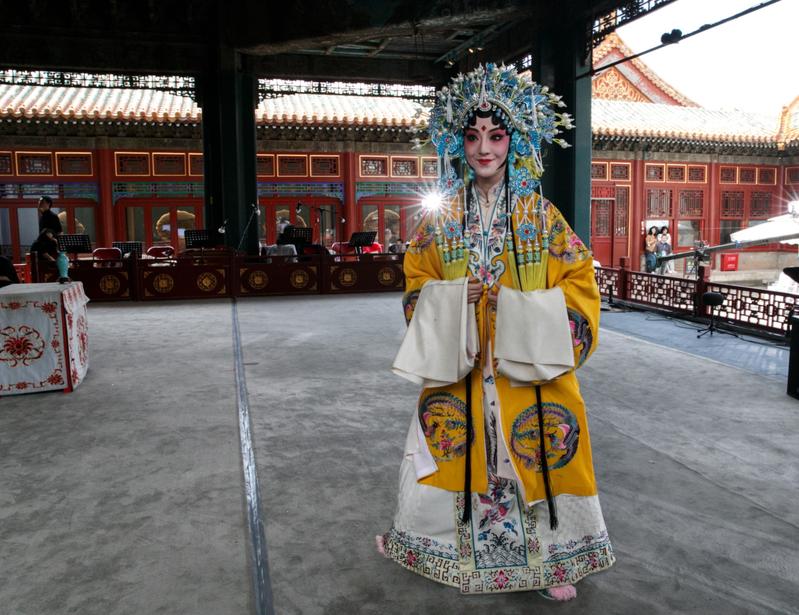 Wei Chunrong plays the role of Yang Yuhuan while performing an excerpt from the 1688 classic The Palace of Eternal Life. (JIANG DONG / CHINA DAILY)
Wei Chunrong plays the role of Yang Yuhuan while performing an excerpt from the 1688 classic The Palace of Eternal Life. (JIANG DONG / CHINA DAILY)
Through decades of honing her skills, Wei can read a lot from a gesture or a glance onstage even before she vocalizes a word.
"Beyond my own performances and techniques as a Kunqu performer, I need to think of how I can bring the opera genre to more stages through new promotional channels," Wei says. "The art can be inherited only when it's favored by the public."
But Wei knows some principles have to be adhered to no matter how much time has changed. She recalls how a student challenged her when she was delivering a lecture on Kunqu at a university.
"Kunqu is more difficult to understand than Peking Opera. Why don't you change the format?" asked the student.
The actress said no.
"If we make big changes to traditions, will that still be Kunqu?" Wei says. "Our duty is to fully display the beauty of the opera to the audience."
Tian says there are more than 10 professional Kunqu troupes in China, and over 100 Kunqu Opera societies have been organized by its fans nationwide.
Following a boom of many local opera genres in the late Qing Dynasty, Tian says the exquisite but relatively slow Kunqu performance gradually lost its luster on the stage of Changyinge in the competition of royal concerts.
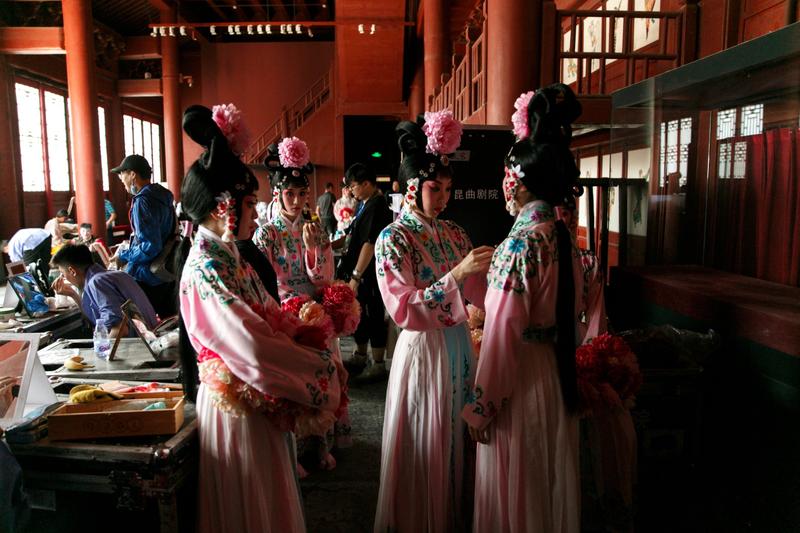 Performers from the Northern Kunqu Opera Theater in Beijing prepare backstage for a special concert at Changyinge, or the Pavilion of Cheerful Melodies, in the Forbidden City in Beijing. The concert, in May, celebrated the 20th anniversary of the opera style being listed as one of the Masterpieces of Oral and Intangible Heritage of Humanity by UNESCO. (JIANG DONG / CHINA DAILY)
Performers from the Northern Kunqu Opera Theater in Beijing prepare backstage for a special concert at Changyinge, or the Pavilion of Cheerful Melodies, in the Forbidden City in Beijing. The concert, in May, celebrated the 20th anniversary of the opera style being listed as one of the Masterpieces of Oral and Intangible Heritage of Humanity by UNESCO. (JIANG DONG / CHINA DAILY)
In 1921, a group of artists established a Kunqu society in Suzhou and greatly contributed to its rescue by categorizing many classical scripts.
"However, with the lack of sustainable development, Kunqu was still on the edge of being buried in history when New China was founded," Tian says. "But a performance saved it in time."
In 1956, a Kunqu troupe from Zhejiang province performed a show in Beijing and received an overwhelming welcome. Premier Zhou Enlai hailed it as "an orchid in the garden of Chinese fine arts". In traditional Chinese culture, the orchid is used to symbolize the elegance and taste of the literati.
It was commonly reported in the media at that time that "a show makes an opera genre survive".
Recalling Kunqu's other monumental moment 20 years ago, Tian considers it not only marks the start of people recognizing the value of Kunqu, but also the earliest days of the Chinese society widely accepting the concept of the protection of intangible cultural heritage.
"At that time, many young people began to realize how brilliant our ancient arts were," Tian says. "It is thus crucial to strengthen our cultural confidence and encourage protection of traditional culture."
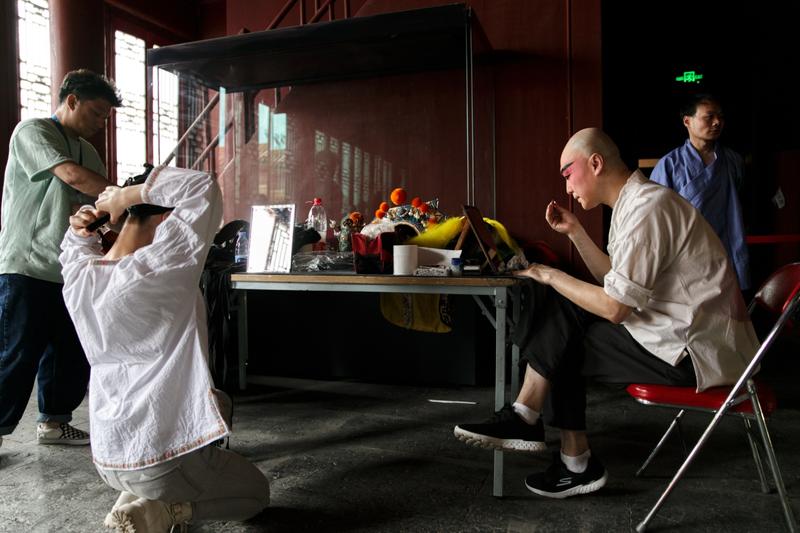 Performers from the Northern Kunqu Opera Theater in Beijing prepare backstage for a special concert at Changyinge, or the Pavilion of Cheerful Melodies, in the Forbidden City in Beijing. The concert, in May, celebrated the 20th anniversary of the opera style being listed as one of the Masterpieces of Oral and Intangible Heritage of Humanity by UNESCO. (JIANG DONG / CHINA DAILY)
Performers from the Northern Kunqu Opera Theater in Beijing prepare backstage for a special concert at Changyinge, or the Pavilion of Cheerful Melodies, in the Forbidden City in Beijing. The concert, in May, celebrated the 20th anniversary of the opera style being listed as one of the Masterpieces of Oral and Intangible Heritage of Humanity by UNESCO. (JIANG DONG / CHINA DAILY)
Cao Ying, deputy director of the Northern Kunqu Opera Theater, is another witness of the rise and fall of Kunqu in the past decades. There were only about 120 people in the troupe in 2001, but it has now grown to more than 250 people.
"One priority is to have performers of the next generation inherit the classics," he says. "That needs continuous nurturing of young talent."
Over the past three years, the theater has systematically organized a training program on the performance of 120 key excerpts from classical scripts, and they plan to cover 200 of these excerpts in the ongoing project. Young performers will receive around 15 days of training for each excerpt.
The troupe is also focused on creating new works based on recent history so as to remain relevant with the times.
"We also need to nurture the audience of the next generation," Cao says. "For many urbanites, enjoying Kunqu can be a trend."
The troupe has regularly organized Kunqu shows in Peking University since 2002, and thus built up a solid fan base at the university. The troupe also introduced Kunqu into the general education of five elementary schools in Beijing in 2016.
"About 5,000 children have joined this program," says Cao excitedly. "And behind these 5,000 children, there are 5,000 families. I believe they will become our loyal fans in the future."
Contact the writer at wangkaihao@chinadaily.com.cn


